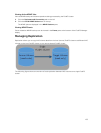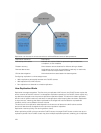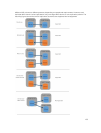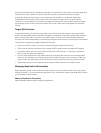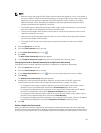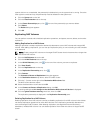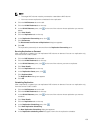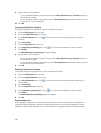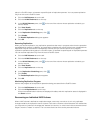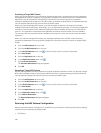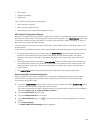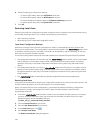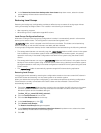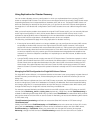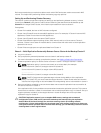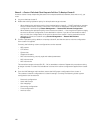
place in a FluidFS cluster, or between a specified pair of replication partners. You can pause replication
only from the source FluidFS cluster.
1. Click the NAS Volumes tab on the left.
2. Click the All NAS Volumestab on the top.
3. In the All NAS Volumes pane, click in the row of the volume whose replication schedule you
want to delete.
4. Click View Details.
5. Click the Replication tab on the top.
6. In the Replication Scheduling pane, click .
7. Click Disable.
The Disable Replication dialog box appears.
8. Click OK.
Resuming Replication
When you resume replication, any replication operations that were in progress at the time the operation
was disabled will resume. In addition, any replication schedules will resume at their next scheduled time.
Replication may be resumed for individual NAS volumes, but you cannot resume all in‐progress
replication operations taking place in a FluidFS cluster, or between a specified pair of replication partners.
You can resume replication only from the source FluidFS cluster.
1. Click the NAS Volumes tab on the left.
2. Click the All NAS Volumestab on the top.
3. In the All NAS Volumes pane, click in the row of the volume whose replication schedule you
want to resume.
4. Click View Details.
5. Click the Replication tab on the top.
6. In the Replication Scheduling pane, click .
7. Click Enable.
The Enable Replication dialog box appears.
8. Click OK.
Monitoring Replication Progress
Monitor the progress of all replication operations being processed for the FluidFS cluster.
1. Click the NAS Volumes tab on the left.
2. Click the All Replicationstab on the top.
All source and destination volumes are displayed in tables, and their replication status is displayed in
the Status column.
Recovering an Individual NAS Volume
When a NAS volume is defined as a replication target, users may not write to it, as it only replicates
changes made to the replication source volume. If the source volume is down because of a malfunction,
you may want to "promote" the target and "demote" the source; i.e. switch their roles so that the former
target is now the "master" or source. This is so that clients can write to the promoted volume.
141



